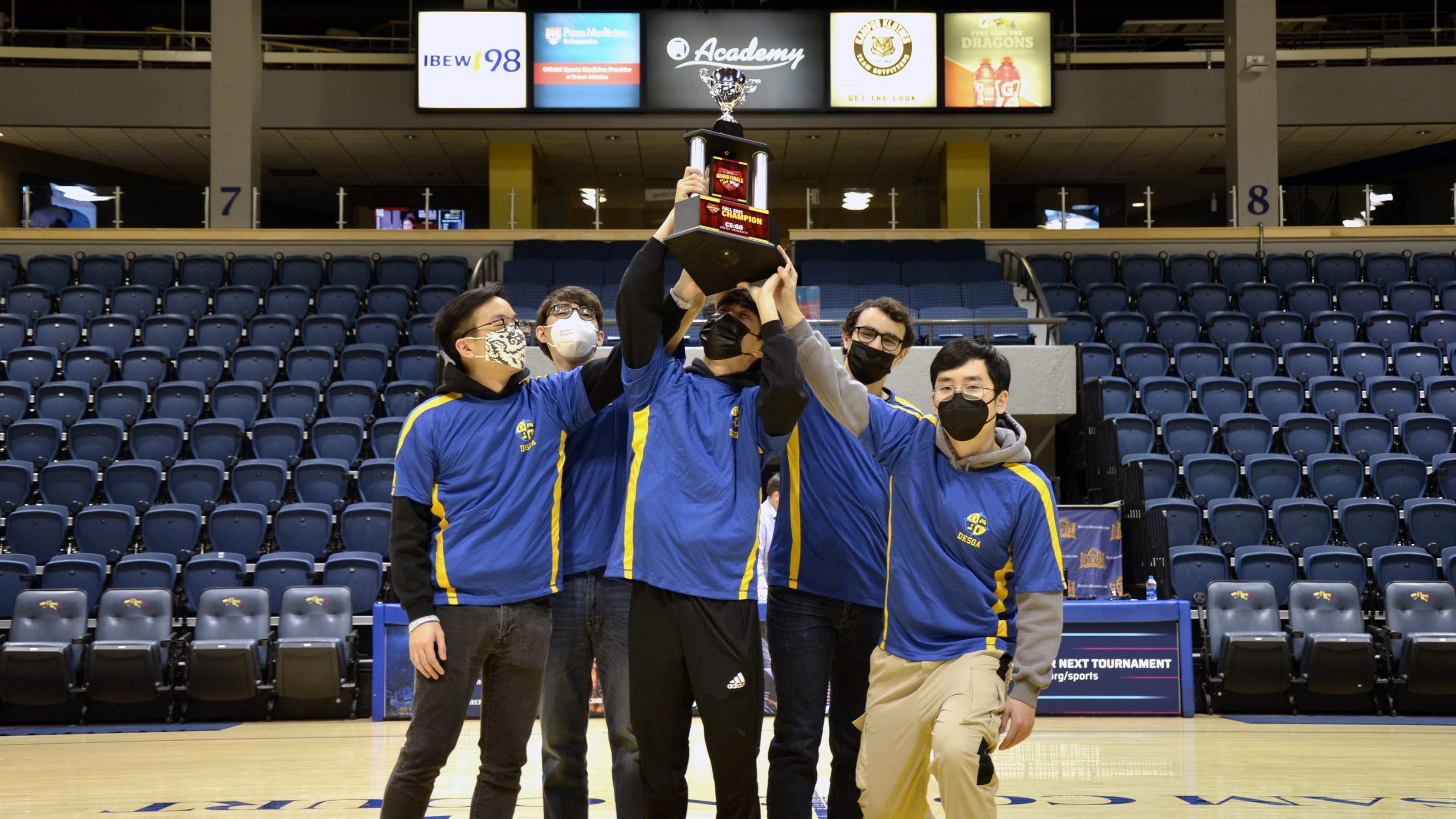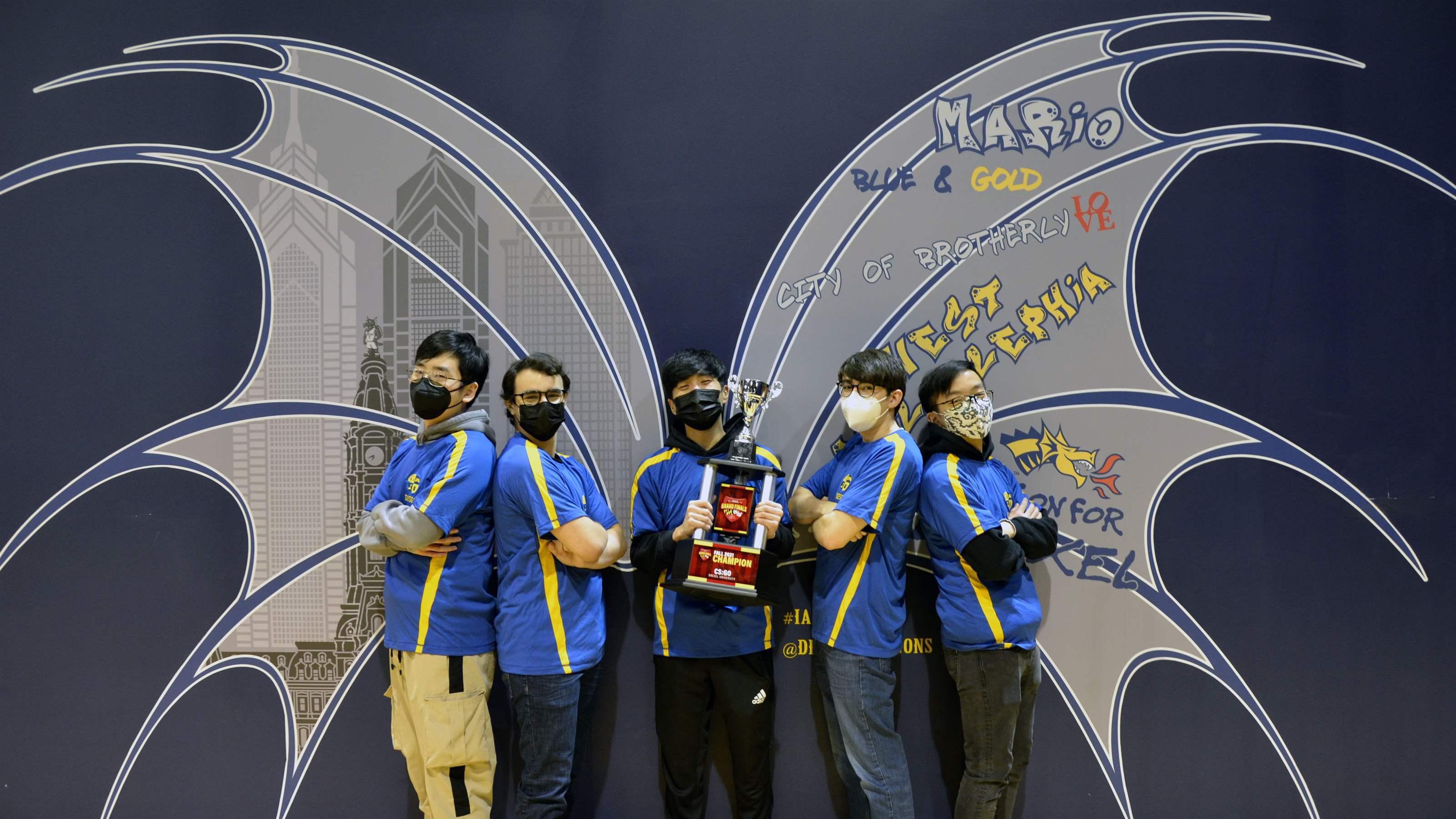Drexel’s Other Champion Athletes

There’s a team of Drexel University athletes who, just last month, edged out Davenport University to become the No.1 collegiate team in North American in their sport. They went up against a team with more resources, coaching support and way more practice time under their belt. They pulled through having to forfeit one of their playoff matches due to timing constraints around competing right before finals week. They came back after losing the first match in that grand final to beat their rivals two out of three in what was considered a David-and-Goliath-esque underdog victory. Now, they have $5,000 in prize winnings and a first-place trophy to show off to the Drexel community, but unfortunately there’s no established home for it just yet.
That’s because this team of athletes has excelled in a new type of sport, not played on a field or a court — not even while the players are in the same room. They’re playing Counter Strike: Global Offensive (CS:GO) through Drexel Esports, which boasts seven club sports teams playing different video games on a competitive level. And their win against over 100 total teams that competed as part of the National Association of Collegiate Esports (NACE) Starleague Fall 2021 season is a huge accomplishment within a burgeoning scene and industry that may be hard to understand for non-gamers, but in which the stakes and the stratification of resources on the collegiate level are hard to deny.
Follow NACE on twitch to watch broadcasted competitions!: https://www.twitch.tv/nacesports
“This was a big accomplishment, a school coming from basically nothing to winning and becoming the best school in the country at this game,” said Noah Vaknin, a third-year software engineering student on the winning CS:GO team. “There should be a sense of pride there, but I feel like outside of our little circle, it doesn't feel as much like that sense of pride exists in a wider scale. Maybe it will never reach the sense of pride and accomplishment that [other sports teams] feel, but we've done something that I don't think 99 percent of the other teams at our school have done.”
Like other athletes, Vaknin has been honing his craft in CS:GO for several years, since his early teens. He is approaching 10,000 hours of play in his lifetime, supported by the four hours a day, seven days a week practice schedule he upholds as part of a team in another league. He dreams of someday soon going pro and making a living playing CS:GO.
“My parents weren't always the most supportive, but they've definitely grown on the idea to the point where they're now incredibly supportive,” Vaknin said. “My grandma watches every single game that I play, which is really cool. It's been a really long road to get to where I am. All of us are still around the same level in that we're not cracking into the pro scene quite yet, but we are definitely all getting there.”
Counter Strike: Global Offensive is a five-on-five, first-person shooting game with an objective of eliminating players on the other team and a caveat of being able to plant/defend or defuse bombs. Different rounds are called “maps” and take place in different environments with unique advantages and challenges — all which top teams must be intimately familiar with and strategize around. Every map goes to best of 30, so the first team to 16 wins. A 15-15 draw warrants overtime.
“[My grandma] describes it is as a game of chess,” Vaknin said. “You have to maneuver around the opponent. You have to understand why they're doing things that they're doing. You have to plan a way to get around that. And then there's … the strategic element, which is that your body has to keep up with your brain. You have to be able to react to the information that you're getting quickly enough to be able to work around it.”
“The thing I really like about this game is I feel like it gives each person's individual play style,” added David Stone, a fourth-year computer science major and the team captain. “There's a lot of personality to each player, and there's a lot of coordination, teamwork and also individual talent that goes into the game more than like other esports that I've seen.”
One factor that the team says contributed to their success last term is the addition of Junjie Lin, a fourth-year finance major who’s very close to cracking pro-level play. All players participate in other leagues and on other rosters outside of Drexel, so the fact that this team just came together for matches was the only reason Lin had time to participate this year. James Tran, a fourth-year game design major, graciously stepped aside to coach/sub and provide Lin a spot on the roster. Jacob Lee, a third-year computer engineering student, and Will Trampel, a fourth-year information systems student, round out the team.
“Before this year, we were pretty solid. We were making playoffs every year,” Stone said. “Then Lin came in and Lin is insanely skilled and brought a lot to the team, helped us fix a lot of our mistakes and was like a strong voice for us going in.”
“I think we have good chemistry on the team,” Lin added. “We’re always on the same page.”
Trampel didn’t start playing CS:GO regularly until he started at Drexel. But through Drexel’s first student organization centered on gaming, now called Drexel Gaming Association and acting as a social sister organization to the club esports teams, Trampel not only found the drive to compete in the game at a high level, but he also found community.
“We have a lot of people that we all interact with and we're all really good friends,” he said. “It’s a very welcoming community.”

Malamas started her own 100-person guild and did private coaching in esports before becoming the leader of these organizations, which she equates to having a full-time job.
“My dream is to get us moved to Athletics and also to have an esports facility on campus,” Malamas said. “Club sports is definitely the start of it, but us becoming the best University in North America for CS:GO is our golden ticket to that. We literally won North America. How many other teams do that?”
Matt Moran, club sports coordinator for Rec Athletics, said there is support from the University to continue to grow Drexel’s esports program, and hopes the CS:GO victory is just one of the first instances of Drexel esports coming out on top.
“It’s honestly astounding how fast esports have grown. I think it’s the next up-and-coming thing,” Moran said. “There’s a lot of money involved in it. It’s a big, growing organization, so for Drexel to be involved in that even at the club sport level is a huge advantage. You’re seeing more and more universities get into it, so the fact that we already have our foot in the door, I think is great. It’s a very large gaming community at Drexel, so to be able to offer them that and have a space they can play competitively I think is a great thing.”
Since this first foot in the door, many more have followed. Drexel is now affiliated with NACE to the extent that they have been accepted into the varsity program, and have gained access to top-tier facilities operated by Nerd Street Gamers, which was founded in Philadelphia. Malamas said she is also working on creating Drexel’s own esports league to throw their own tournaments with other universities of their choosing.
Trampel said, the upper-class students who’ve invested a lot in growing this community would love to see more people interact with esports at Drexel in any capacity.
“More growth would really help us pass this down in the next couple of years when we graduate,” he said. “That way we can kind of keep this going. We don't want this to die. This is like something that we've invested so much time into and we really care about.”
In the meantime, they’re just looking forward to the next match, the next laugh, and maybe to find a spot in the Rec Center for that trophy.
“Every time we walk past [it] we'll be like, ‘Yeah, that trophy? We won that playing video games,” Stone said.
In This Article
Drexel News is produced by
University Marketing and Communications.

